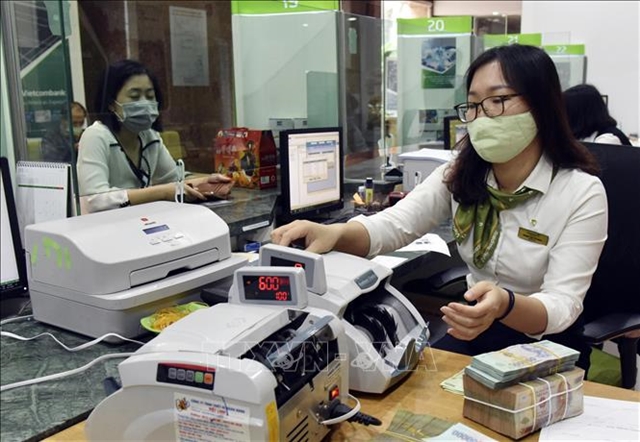According to analysts of the VCB Securities Company, the outstanding export loans to the enterprises only account for five per cent of the total outstanding loans of the whole banking system,

HÀ NỘI — As bank credit to export and FDI enterprises has remained modest, tariff changes, if any, will not significantly impact domestic banks, experts said.
According to analysts of the VCB Securities Company, the outstanding export loans to the enterprises only account for five per cent of the total outstanding loans of the whole banking system, and the outstanding FDI loans account for about two per cent.
Meanwhile, banks with large export-import and FDI outstanding loans are State-owned banks such as VietinBank, BIDV and Vietcombank - which have a solid financial foundations, good risk management capabilities and sufficient capital to absorb short-term shocks from the market.
According to statistics at the financial data provider Wichart, by the end of the fourth quarter of 2024, Vietcombank, VietinBank and BIDV were respectively the three banks with the largest ratio of FDI enterprise loans per total outstanding loans in the banking system. Specifically, Vietcombank's enterprise loan ratio is 10.2 per cent (equivalent to VNĐ147.78 trillion), VietinBank, 5.78 per cent (equivalent to VNĐ99.5 trillion) and BIDV, 3.54 per cent (equivalent to VNĐ72.7 trillion).
As for the group of private banks, MB led with 2.42 per cent, Techcombank with 1.93 per cent, VIB with 1.08 per cent and ACB with 0.93 per cent.
Banks that are focusing on promoting access to the FDI group such as VPBank, Techcombank and MB are expected to face short-term challenges in expanding credit in this segment. When being affected by trade barriers, especially in the field of exporting to the US market, FDI enterprises may be forced to reduce production and delay investment plans that will cause a reduction in credit demand.
Sharing the same view, analysts of the MB Securities Company believe that in general, banking is one of the industries that is less affected by changes in tariff policies and they will still maintain their credit growth target in 2025.
For the group of State-owned banks, the credit growth plan for 2025 is set at 15-16 per cent. Meanwhile, in the group of private commercial banks, some banks are still setting high credit growth rates, such as MB with 26 per cent, HDBank with 25-26 per cent and VPBank with 20-25 per cent).
The Chief Economist of the Saigon Securities Incorporation Phạm Lưu Hưng, also expects not much impact from any tariff changes, as the main driver of credit growth still comes from the domestic market and is not overly related to exports.
In the context of the Government’s high economic growth target, banks have more room to lend in public investment and infrastructure sectors that are considered by many banks as the main driver for their credit growth in 2025.
The recovery of the real estate market, as well as personal credit, is also considered another driver for credit growth this year. — BIZHUB/VNS









